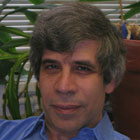For if we ever begin to suppress our search to understand nature, to quench our own intellectual excitement in a misguided effort to present a united front where it does not and should not exist, then we are truly lost.
–Stephen Jay Gould
If you’re a regular at this website, you’ve heard me complain about scientific organizations that sell evolution by insisting that it’s perfectly consistent with religion. Evolution, they say, threatens many peoples’ religious views — not just the literalism of Genesis, but also the morality that supposedly emanates from scripture. Professional societies like the National Academy of Sciences — the most elite organization of American scientists — have concluded that to make evolution palatable to Americans, you must show that it is not only consistent with religion, but also no threat to it. (And so much the better if, as theologians like John Haught assert, evolution actually deepens our faith.) Given that many members of such organizations are atheists, their stance of accommodationism appears to be a pragmatic one.
Here I argue that the accommodationist position of the National Academy of Sciences, and especially that of the National Center for Science Education, is a self-defeating tactic, compromising the very science they aspire to defend. By seeking union with religious people, and emphasizing that there is no genuine conflict between faith and science, they are making accommodationism not just a tactical position, but a philosophical one. By ignoring the significant dissent in the scientific community about whether religion and science can be reconciled, they imply a unanimity that does not exist. Finally, by consorting with scientists and philosophers who incorporate supernaturalism into their view of evolution, they erode the naturalism that underpins modern evolutionary theory.
The National Academy website also includes three statements by religious scientists, Kenneth Miller, Father George Coyne of the Vatican, and Francis Collins, averring no conflict between the Gouldian magisteria.
There are no statements by anyone who sees faith and science as in conflict. This is not because those people don’t exist: after all, there are plenty of scientists and philosophers, including myself, Richard Dawkins, Sam Harris, Steven Pinker, P. Z. Myers, Dan Dennett, A. C. Grayling, and Peter Atkins, who feel strongly that science and religion are incompatible ways of viewing the world. Several of these people have written books to that effect. Apparently the NAS prefers to ignore this dissent.
When a professional organization makes such strong statements about the compatibility of science and faith, and ignores or gives but a polite nod to the opposing view, that organization is endorsing a philosophy. This goes beyond saying that evolution is true. The NAS is saying that most religious people and scientists have no problem with evolution and faith. Given that 40% of Americans reject evolution outright (almost entirely on religious grounds), while 92% of NAS scientists reject the idea a personal god, the National Academy is clearly pushing its agenda in defiance of evidence.
In the rest of this post I’d like to explore the ways that, I think, the NCSE has made accommodationism not only its philosophy, but its official philosophy. This, along with their endorsement and affiliation with supernaturalist scientists, philosophers, and theologians, inevitably corrupts their mission.
Let me first affirm that I enormously admire the work of the NCSE and of its director, Eugenie Scott and its president, Kevin Padian. They have worked tirelessly to keep evolution in the schools and creationism out, most visibly in the Dover trial. But they’re also active at school-board hearings and other venues throughout the country, as well as providing extensive resources for the rest of us in the battle for Darwin. They are the good guys.
So why am I using this space to criticize the organization? I suppose it’s because I feel that in its battle against creationism, the NCSE should represent all evolutionary biologists. But they are not representing a lot of us when they nuzzle up to theologians and vigorously push the harmony of science and religion. In effect, they’re pretending that the many people who disagree with their philosophical message don’t exist. Yet they can afford to ignore us because, in the end, where else can we atheists go for support against creationists?
The pro-religion stance of the NCSE is offensive and unnecessary — a form of misguided pragmatism. First, it dilutes their mission of spreading Darwinism, by giving credibility to the views of scientists and theologians who are de facto creationists, whether they admit it or not. Second, it departs from their avowed mission to be philosophically neutral. Third, it disingenuously pretends that evolution poses absolutely no threat to faith, or conflicts with faith in any way.
None of this would be a problem if the NCSE would just stick to its avowed mission and “neutral” stance toward religion.
The “recommended books” page of the NCSE’s religion section gives the same one-sided view. The section on “Theology, Evolution, and Creation” lists 36 books. Every one of them appears to offer an accommodationist viewpoint. Another 38 books appear (on the same page) in a “related themes in science and religion” section on the same page. In both section we find all the familiar names: Francis Collins, John Haught, Kenneth Miller, Michael Ruse, Simon Conway Morris, John Polkinghorne, Joan Roughgarden, and so on — accommodationists all. There are no books by Daniel Dennett, Sam Harris, Richard Dawkins, Christopher Hitchens, A.C. Grayling, and all those who have criticized the science-faith concordat.
As is usual in accommodationist literature, when the neo-atheist evolutionists are mentioned, they are done so dismissively, and held partially responsible for arousing anti-evolution sentiment:
When scientists such as William Provine and Richard Dawkins present philosophical materialism as the inevitable outgrowth of science or evolution (Dawkins 1987; Provine 1989) they reinforce the view encouraged by Morris and other antievolutionists that “one cannot be an evolutionist and a Christian.”
..
the Catholic church itself has gone back and forth on the veracity of evolution. Pope John Paul II, for example, declared that God inserted a soul somewhere in the lineage between Australopithecus and Homo. (Scott mentions this view, albeit only in passing, in an essay “Creationists and the Pope’s Statement.” But Dr. Scott’s long discussion of the position of the Catholic Church is celebratory, completely ignoring how the views of many Catholic contravene everything we know about human evolution.
But my main beef is this: the NCSE touts, shelters, or gives its imprimatur to intellectuals and scientists who are either “supernaturalists” (the word that A. C. Grayling uses for those who see supernatural incursions into the universe) or who have what Dan Dennett calls “belief in belief”—the idea that while religion may be based on false beliefs, those beliefs are themselves good for society. (Among the former are Kenneth Miller and John Haught, the latter Michael Ruse and Francisco Ayala). Both of these attitudes draw the NCSE away from its primary mission of promoting evolutionary biology, and push it into the hinterlands of philosophy and theology.
The directors of the NCSE are smart people. They know perfectly well — as did Darwin himself — that evolutionary biology is and always has been a serious threat to faith. But try to find one acknowledgment of this incompatibility on their website. No, all you’ll find there is sweetness and light. Indeed, far from being a threat to faith, evolution seems to reinforce it! Is it disingenuous to be a personal atheist, as some NCSE officials are, and yet tell others that their faith is compatible with science? I don’t know. But the NCSE’s pragmatism has taken it far outside its mandate. Their guiding strategy seems to be keep Darwin in the schools by all means necessary.
Am I grousing because, as an atheist and a non-accommodationist, my views are simply ignored by the NAS and NCSE? Not at all. I don’t want these organizations to espouse or include my viewpoint. I want religion and atheism left completely out of all the official discourse of scientific societies and organizations that promote evolution. If natural selection and evolution are as powerful as we all believe, then we should devote our time to making sure that they are more widely and accurately understood, and that their teaching is defended. Those should be the sole missions of the National Academy of Sciences and the National Center for Science Education. Leave theology to the theologians.
























